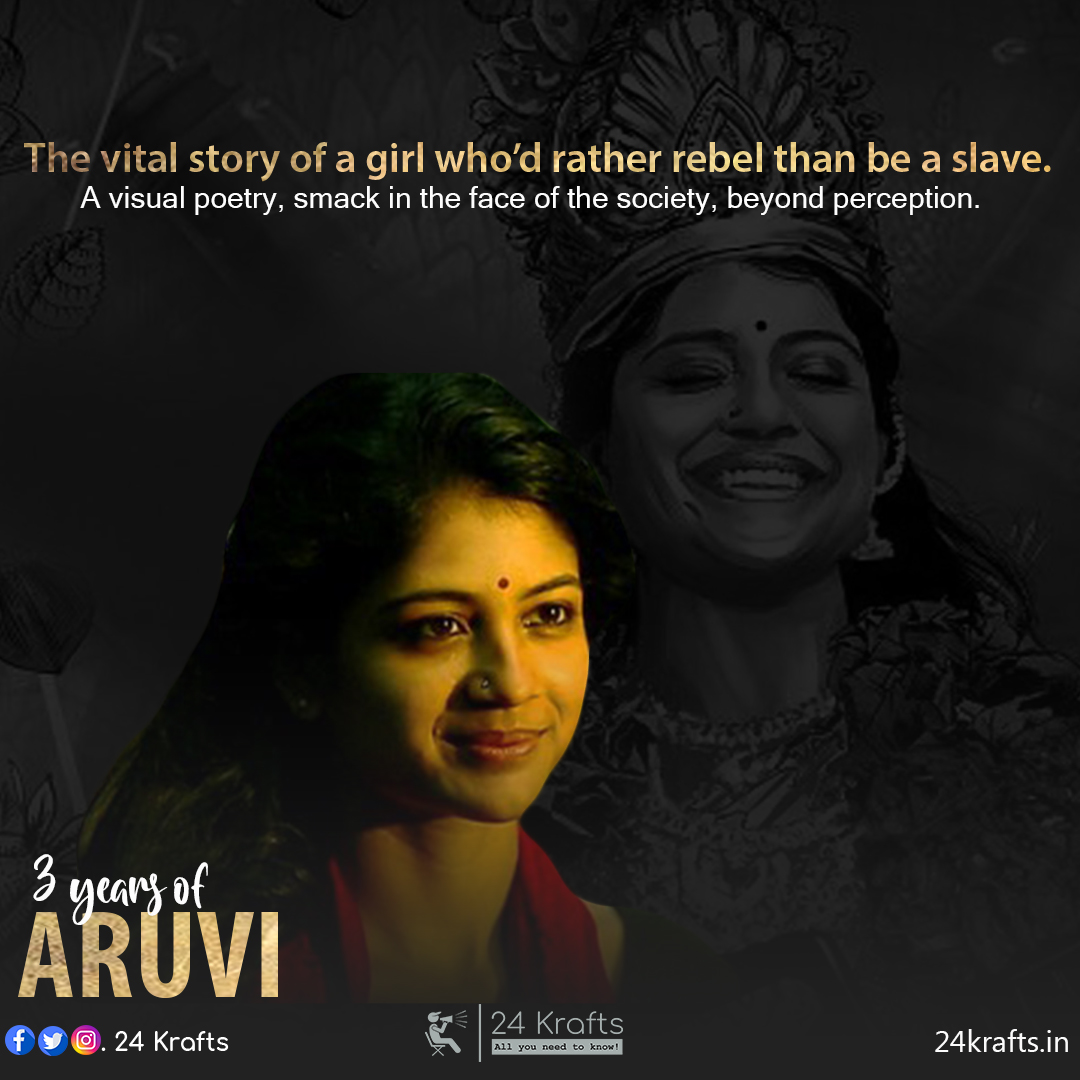Aruvi, directed by Arun Prabhu, is a social commentary that’s as much about ripping apart a popular talk show, as it is about holding a mirror to you, the audience. It traces the life of Aruvi, a 25-year-old woman through multiple narratives and unpredictable circumstances. Tragedy, gunshots, rape, abandonment; Aruvi goes through it all. And yet, there is hope at the end, because neither the character nor the film passes judgement. Disillusionment never felt this good! Aruvi features a cast and crew of first-timers. Except for Lakshmi Gopalswami, who is brilliant as the host of a reality show that rips apart the movie. It is unlike any other Tamil film. The audience should risk holding a mirror in front of them.
This is a gutsy and outstanding film. ‘Aruvi’ means a mountain stream, an apt title as the movie itself is a flow of emotions. In an era of a shallow and fraudulent film masquerading as good cinema, here is something pure, and at the same time, entertaining. A big hug for debutant director Arun Prabhu, who was willing to take the road less travelled, and actress Aditi Balan for doing a role which no mainstream heroine would dare take up. Aruvi is a well-conceived satire on money-minded modern society. The film is emotionally moving; as mentioned earlier, it is also entertaining but is underlined by a tone of gloom. It is written brilliantly to provide drama, tension, laughter, black humour, anger, frustration, some tragic moments and to create an awareness of something we dread.
Aruvi is a modern master class in storytelling. What is required of good literature is also required for good cinema, showing instead of telling. The shots that make up a scene and the scenes that make up a movie should tell us about the character’s motives and intentions. Everything should not be spelt out by the actors. And Arun Prabhu has done the same with Aruvi. Aruvi’s actors do a lot of things on the screen, but they don’t literally ‘tell’ you what they are up to.
The movie opens with a shot of officer Shakeel (Mohammad Ali Baig) interrogating Aruvi (Aditi Balan). But you don’t see Aruvi immediately. You first get to see a pair of eyes and a bruised mouth, and later, the complete face. You put them together and you see the protagonist. The entire film follows in the same vein. You can never say, ‘Oh, there, I see what she (Aruvi) is all about’ until the movie is about to reach its conclusion. And therein lies Aruvi’s beauty. Aruvi is no thriller, but it forces you to think. Why is Aruvi, the main protagonist, the way she is? The film does not follow a linear narrative. The movie, at the time, feels like a documentary. This is especially true of the scene when both Aruvi and her best friend Emily (a transgender, played wonderfully by Anjali Vardhan) are sitting and talking by a waterfall.
Aruvi is about a seemingly innocent and ordinary girl, who after growing up in poverty, is forced to make her path after she is tested positive for HIV. Her father, who she deeply loves and admires, abandons her and so does the rest of her family. Aruvi is devastated. But we don’t get to know about her family’s reason for throwing her out of the house instantly, we presume it is because she has vomited, and is therefore pregnant. The father-daughter bond is also portrayed wonderfully. Aruvi and her father are close, and we know the kind of impact she has on him when early on in the film, she asks her father to quit smoking, and he does. Later, when she is older, and when their relationship undergoes a strain, he takes it up again. He is hurt, upset that the daughter he had trusted with everything dear to him, has ‘betrayed’ him.
One of the most interesting devices used in the story to make the narrative move forward is the inclusion of reality show Solvathellam Sathyam, which loosely translates to whatever is spoken is the Truth. The reality show is a strong narrative tool, which not only reveals Aruvi’s motives and her ‘truth,’ but also serves as comic relief in the movie. The characters–the snob, the poor, the meek, the culprits, the loyal friend and her protagonist–get together and play a game after the reality show bit gets over. And the following scenes of the film form the funniest part of Aruvi. Through a game of make-believe and Spin the Bottle, our players question and resolve conflicts.
The director uses satire and black humour to make his point. The film is a triumph of honest writing. The scene where Aruvi delivers a stunning speech to her hostages in the TV studio to speak out against TRP-run reality shows is an eye-opener. The idea is everything in, modern society is driven by the craze for money and human values are taking a backseat. The director takes a dig at everyone from money-minded medical companies to those in Kollywood making crappy commercial movies!
Aruvi is powered by an outstanding performance in the title role by Aditi Balan, she is simply fantastic. She inhabits Aruvi, you can feel the earnestness of her intentions and at the same time, the wetness of her tears, especially the final breakdown. The supporting characters — all mostly newcomers — elevate the film. The musical score by Bindu Malini and Vedanth Bhardwaj heightens the mood and is in perfect sync with the narration.
If you want to nit-pick, the film slides a bit by taking a preachy tone and overstretched melodrama towards the end. Aruvi is a breath of fresh air cinematically because the writer-director employs all kinds of tools to make the audience understand that he trusts them enough to know that they will ‘get’ Aruvi, without him resorting to conventional tell-tale signs. But in the end, irrespective of the pros and cons, Aruvi is arguably one of the best films to have emerged out of Kollywood.



